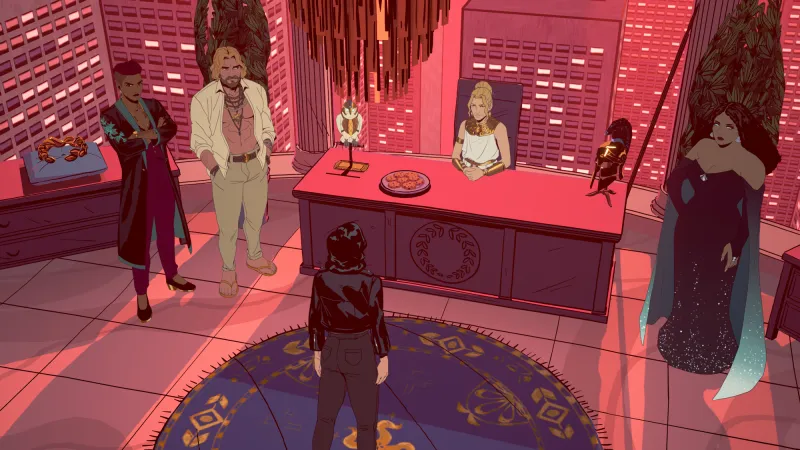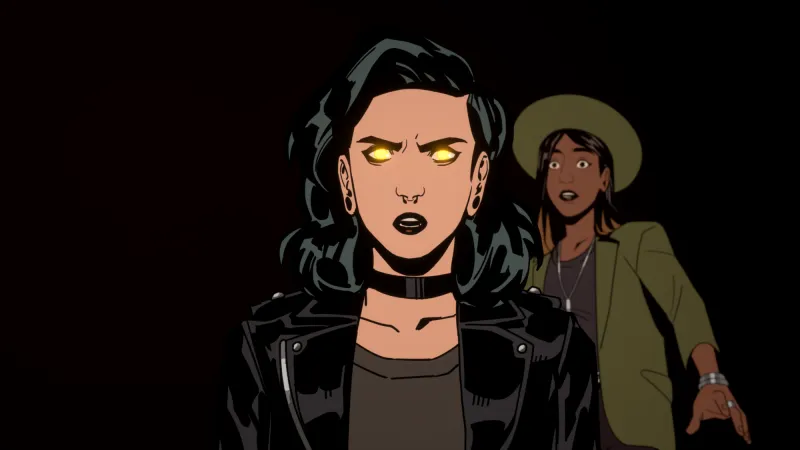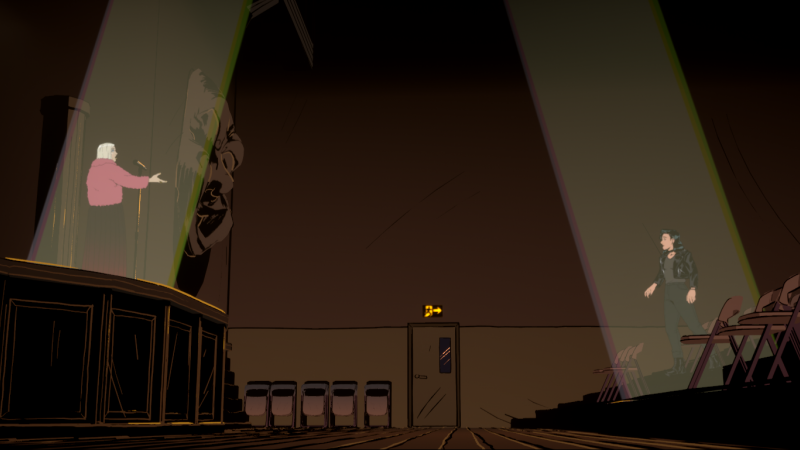I’m a fan of musicals of all kinds. From Hamilton to La La Land to Bob’s Burgers, if the characters in your story burst into song, I’m more than likely on board. For this exact reason, Stray Gods: The Role-Playing Musical caught my eye, exciting both my inner fan of musicals and my inner fan of games. Despite some complaints about glitches and awkward songwriting in a few places, developer Summerfall Studios harmonizes these concepts well, putting on a show I can’t help but applaud.
In Stray Gods, you play as Grace, a woman accused of murdering a Muse, a magical being from ancient Greece. In this world, these mythical figures are known as Idols, reincarnations of Greek gods that have died and passed their abilities to humans, granting them immortality and supernatural abilities. Because Grace was there when the Muse died, she’s been gifted the power of song and can compel people to sing their feelings in big, interactive musical numbers. I appreciated that there was an in-world reason for this, and found the worldbuilding as a whole to be simple, but fresh. Adaptations of Greek myth are extremely common in pop culture, but Stray Gods tells an original enough story that the world stays unique.
The game’s title refers to it as a “role-playing” musical, but that term might be misleading to some. There is no gear, experience, or leveling up – just role-playing in the truest sense of the word by making decisions as your version of Grace. At the start of the game, you get to choose one of three personality traits (Charming, Kickass, or Clever) that unlock different dialogue options during conversations. Most of the gameplay consists of communicating with people and choosing what to say, either through speaking, or when Grace decides to activate her powers through singing.
The songs are Stray Gods’ most impressive achievement. As you hear each character sing, you get a list of options for how to respond in the middle of the song. And while the game gives you plenty of time to pick, this selection process is timed with the music, so you have to decide quickly and with your gut. At first, this concept stressed me out, but as the game continued, I grew to love it. I wasn’t plotting out the exact reaction I wanted to have, I was truly role-playing and acting as I thought Grace would. If that concept stresses you out or you have some other reason to avoid quick decisions, you can disable timed choices in the settings menu, but I recommend playing with the timer for a better experience.
As you pick different options, songs branch out and evolve into entirely new forms, and affect the story of the game accordingly. Depending on your choices, different characters appear later in the story, while others might live or die. In my first playthrough, I decided to be Charming and tried to empathize with most characters that I met. But on a second playthrough, I decided to test out the Kickass trait, since it was rarely a choice I would have otherwise made. This time, the story was a little different, but mainly altered my relationship with other characters rather than the overall plot. I didn’t mind this, as it still makes repeat playthroughs more interesting, but each path still has to guide you to hit the same songs.

However, once I reached those songs, the music was vastly different. I expected similar notes with different lyrics and maybe altered accompaniment, but I was delighted to see just how fundamentally songs can change. Some were completely unrecognizable; a sad, hauntingly beautiful song I’d been looking forward to after my first playthrough made a complete left turn and became a rock song when I selected a different option. Experiencing these songs a second time around hugely improved my opinion of the game. The changes are thrilling to discover, and I liked some songs way more when I picked different lyric options.
Of course, none of these songs or scenes would be enjoyable at all if the cast performing them wasn’t talented, so I was glad to see they very much are. The credits are full of seasoned voice actors, so I went in with high expectations, but was still impressed by how well it was cast, especially the side roles. Troy Baker does a great job as Apollo, but supporting characters like Anjali Bhimani’s Medusa, Erika Ishii’s Hermes, and Rahul Kohli’s Asterion were highlights every time I encountered them.
The cast is led by Laura Bailey’s Grace, and while she never drops the ball while acting, there were a few instances where I thought her skillset as a singer didn’t exactly match the songs she was singing. In some songs, like in an early confrontation with Persephone, certain selections cause Grace to slip into a faster, rap-like cadence. She’s phenomenal at belting and singing more typical Broadway-style songs, but when things get too fast she’s definitely out of her element. It’s hard to say if it’s the lyricism of the section or Bailey’s discomfort with the style, but these moments fell short of the standard the rest of the game was able to achieve. Luckily, the game’s design allows you to pivot away from a part of a song you don’t like – just select a different color at the next decision path and hear a new style you might prefer.

My largest source of complaint, however, is a number of recurring glitches. One is the game’s occasional tendency to start a voice line a split second into the first word, creating a jarring clipping effect. It happened most often with Freddie’s lines, which also varied in volume to an odd degree, speaking much louder or softer than her scene partners. On a few occasions, I also noticed character models disappearing for a line or two of dialogue, and at one point during my second playthrough, I had to repeat an entire conversation with Pan in a different location, immediately after ending the previous one. Hopefully, these issues are fixed in the future.
While these glitches did detract from my experience, they far from ruined it. Overall, Stray Gods rocks. Between the cast’s fantastic performances, a fun twist on Greek mythology, and a genuinely novel game mechanic, it’s a game I didn’t know I needed, but one I’m happy to give a standing ovation to.
For more Stray Gods, check out our exclusive reveal of the opening song, along with our behind-the-scenes look at how the music was written.
